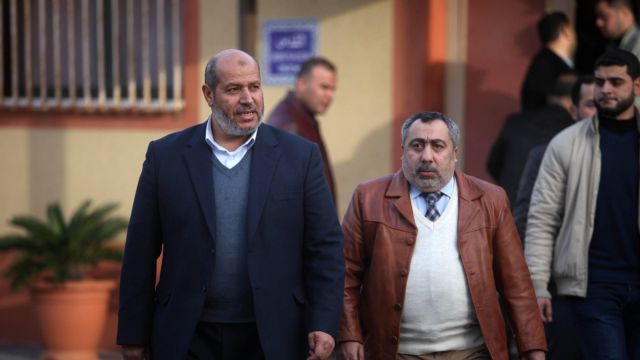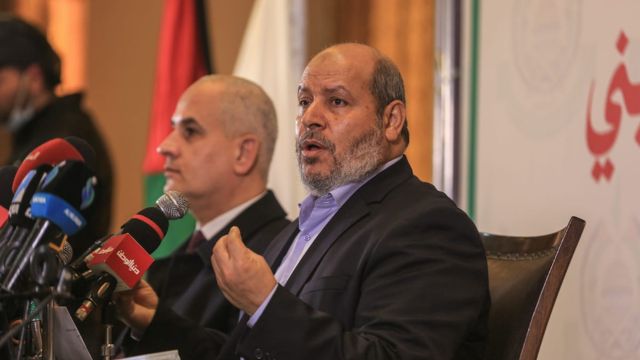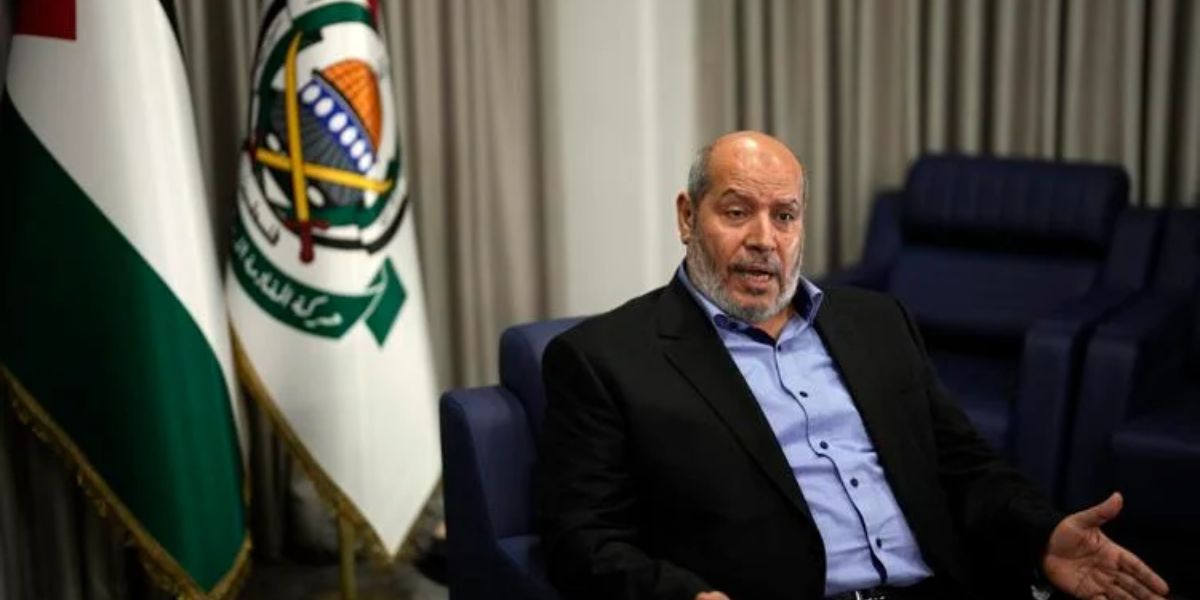An Official From Hamas Says That If A Two-State Solution Is Put Into Place, The Group Would Surrender Its Weapons
Istanbul — A senior Hamas political figure told The Associated Press that if an independent Palestinian state is created following pre-1967 boundaries, the Islamic militant group would put down its arms and become a political party. It would also be willing to negotiate a truce with Israel lasting at least five years.
Following months of deadlock in cease-fire negotiations, Khalil al-Hayya made these remarks in an interview on Wednesday. When Hamas announced that it would disarm, it seemed like a big backward step from the terrorist organization that was formally dedicated to destroying Israel.
However, Israel is not likely to entertain such a scenario. After the horrific bombings on October 7 that started the conflict, it pledged to destroy Hamas, and its current leadership is fiercely against the establishment of a Palestinian state on territory Israel won in the 1967 Mideast war.
Al-Hayya, a senior Hamas official who has acted as the militants’ representative in talks for a cease-fire and hostage swap, adopted a tone that was at times defiant and at other times accommodative.

Speaking to the AP in Istanbul, Al-Hayya stated that to establish a single government for Gaza and the West Bank, Hamas wishes to join the Palestine Liberation Organization, which is led by the opposing Fatah movement. In line with international resolutions, he declared that Hamas would recognize “a fully sovereign Palestinian state in the West Bank and Gaza Strip and the return of Palestinian refugees” along Israel’s pre-1967 boundaries.
He declared that the group’s military wing would disband in such an event.
“Considering all the people who battled against occupiers, what have these forces accomplished once they gained their independence, their state, and their rights? Their protecting combat forces have evolved into the national army, and they have become political parties,” he claimed.
RELATED TO – Mark Zuckerberg’s Focus on Meta’s Financial Drain Leads to $200 Billion Devaluation
Hamas has occasionally softened its public stance over the years on the prospect of a Palestinian state alongside Israel. However, its political platform still formally “rejects any alternative to the full liberation of Palestine, from the river to the sea”; this refers to the region that encompasses the present-day state of Israel and runs from the Jordan River to the Mediterranean Sea.
Al-Hayya did not clarify if his seeming support for a two-state solution would mean that the Palestinian-Israeli conflict would end or if it would only be a stopgap measure before the group’s declared objective of destroying Israel would be achieved.
Israel and the Palestinian Authority, the internationally recognized self-governing body that Hamas drove out when it took control of Gaza in 2007, a year after winning Palestinian parliamentary elections, did not respond right away. The Palestinian Authority was left in charge of running several semi-autonomous areas of the Israeli-occupied West Bank following Hamas’ takeover of Gaza.

The West Bank, east Jerusalem, and Gaza—areas that Israel took during the 1967 Middle East war—are the targets of the Palestinian Authority’s quest to create an independent state. The hard-line administration led by Israeli Prime Minister Benjamin Netanyahu opposes a two-state solution, despite the overwhelming backing of the international community for it.
The conflict in Gaza has gone on for almost seven months, and talks to establish a cease-fire have stagnated. The conflict started on October 7 when militants led by Hamas attacked southern Israel, killing over 1,200 people, the majority of whom were civilians.
RELATED TO – Michael Cohen Temporarily Halts Trump Critique Online Amid Hush-Money Trial Testimony
About 250 hostages were hauled into the enclave by militants. Following the Israeli shelling and military offensive in Gaza, over 34,000 Palestinians have died, mostly women and children, according to local health authorities. Approximately 80% of the 2.3 million people living in Gaza have also been forced to flee their homes.
Over a million Palestinians have fled to the southern city of Rafah, where Israel is currently preparing for an offensive.
Since the beginning of the war, Israel claims to have destroyed most of the first twenty-two Hamas battalions; the four that remain are reportedly holed up in Rafah. Israel maintains that defeating Hamas requires a Rafah onslaught.
Al-Hayya stated that Hamas could not be destroyed by such an onslaught. He claimed that “contacts, decisions, and directions are made in consultation” between the two parties and that “contacts, decisions and directions are made in consultation” between the military leadership inside Gaza and the political leadership outside.
He said that the Israeli military “had not destroyed more than 20% of (Hamas’) capabilities, neither human nor in the field.” How are they going to kill (Hamas) if they are unable to? The consensus process is the answer.
Over 100 hostages were freed during a week-long cease-fire in November in exchange for thousands of Palestinian inmates detained in Israel. However, negotiations for an extended ceasefire and the release of the remaining captives have been suspended, with both sides blaming the other for being uncooperative. Important partner Qatar has announced in the last few days that it is “reassessing” its mediation role.
Formerly stationed in Qatar, the majority of Hamas’ top political figures have departed the Gulf nation in the last week and gone to Turkey, where on Saturday, Hamas leader Ismail Haniyeh visited Turkish President Recep Tayyip Erdogan. Al-Hayya stated that Hamas wants Qatar to continue acting as a mediator in the negotiations and disputed that plans are underway for the group’s primary political office to be permanently moved.
Hamas has been charged of not being serious about an agreement by Israeli and US officials.
Al-Hayya refuted this, claiming that in exchange for the Israeli captives still held, Hamas has made compromises on the number of Palestinian inmates it wishes to be freed. He claimed that the organization is unsure of the precise number of hostages that are still alive and in Gaza.
However, he asserted that Hamas will not back down from its demands, which Israel has rejected, for an unconditional cease-fire and the complete evacuation of Israeli troops. Israel claims that it will keep up military operations until Hamas is ultimately destroyed and that it will then maintain a security presence in Gaza.
Regarding the remaining hostages, the Hamas commander questioned, “If we are not assured the war will end, why would I hand over the prisoners?”
Al-Hayya reportedly hinted that Hamas might assault Israeli or other forces that might be positioned near a floating dock that the United States is rushing to construct along Gaza’s coastline to transport aid by water.
He declared, “We will deal with any military force present in these places, Israeli or otherwise, as an occupying power, and we categorically reject any non-Palestinian presence in Gaza, whether at sea or on land.”
Despite the devastation that the October 7 strikes have caused to Gaza and its people, Al-Hayya stated that Hamas does not regret them.
Despite overwhelming evidence to the contrary, he denied that Hamas terrorists had targeted people during the strikes. Instead, he claimed the operation was successful in its purpose of reviving interest in the Palestinian struggle around the world.
Furthermore, he asserted, Israeli efforts to destroy Hamas will eventually be ineffective in stopping upcoming armed uprisings by Palestinians.
Assume for the moment that Hamas has been annihilated. “Are the Palestinians no longer there?” he inquired.











